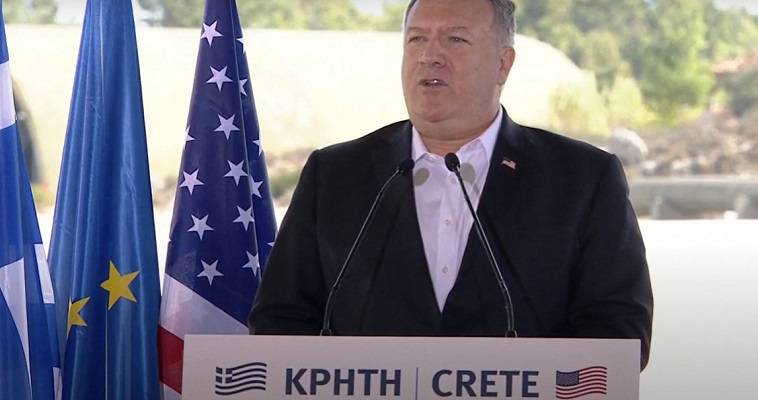Kostas Grivas: The fear of a Eurasian NATO – How the US weighs Greece and Turkey
01/10/2020
Many Greeks are unable to accept that the United States is putting pressure on Greece on issues critical to its defense, such as the removal of heavy weapons from the islands of the eastern Aegean, for the sake of Turkey. And of course they do not accept that Washington is pursuing a pro-Turkish policy. On the contrary, they believe that Greece is developing into a strategic ally of Washington, while Turkey is constantly moving away from the West.
In order to strengthen their point of view, they invoke the growing voices inside the United States calling for the expulsion of Turkey from the western camp, while at the same time the relations with Greece are constantly strengthening. Especially if the removal of nuclear weapons from Incirlik and the upgrade of the Souda base proceed, then (in their view) the situation will be clarified.
Greece will change becoming the extreme limit of western geopolitical architecture, while Turkey will sink into the Eurasian abyss and become an enemy of the West. However, these views do not include in their estimations the qualitative changes that have occurred in recent years in the geopolitical identity of the two countries, in American geostrategic perception, but also in the international system as a whole.
In particular, in the past, Greece and Turkey had, more or less, the same geopolitical function within the Western world, with Turkey being treated as slightly more important than Greece. This was also reflected in the infamous seven to ten ratio of US military aid. Today, however, the two countries are on different paths.
Turkey is a US geostrategic partner
Greece is indeed evolving into an increasingly stable ally of the United States, while Turkey is moving away from the West and claiming the role and position of an Eurasian power, a fact that often brings it into conflict with American interests. But this development also makes it a potentially valuable partner for Washington, especially in a critical function, the containment of China.
I am not just referring to the Central Asian “corridor”, which starts in Turkey, passes through the Turkic-speaking former Turkic Republics of the Soviet Union, and ends in Xinjiang in northern China. By the way, Azerbaijan’s attack on Armenia, under the guidance and support of Turkey, should probably be considered in this context as well.
However, apart from the “corridor” of the Turkish-speaking countries, Turkey’s privileged relations with critical countries of the Eurasian region are equally important, predominantly with Pakistan, but also with Indonesia, Malaysia, and others. To put it simply, a strong Turkey can act as a counterweight to China and keep Pakistan, for example, from becoming an organic part of Chinese geopolitical architecture.
Of course, in order to function in this way, it must also maintain organic ties with the West, albeit loose. Otherwise, it is in danger of being integrated into the new geopolitical shape of the Eurasian Multi Power that is currently being formed. That is, in a loose, but functional grouping of many Eurasian states, with the core being the China-Russia system.
Eurasian “NATO”
This Multi Power will integrate the cooperative, but also the competitive elements of the countries that compose it, in a single geopolitical identity. We could perhaps describe it as something like an informal Eurasian NATO, but with much greater geopolitical depth and dynamics than the original NATO. This modular Multi Power arose largely as a result of the foolish and arrogant US policy of continuing to operate in a multipolar world as if it were a monopoly.
Thus, an “against all” policy initially pushed Moscow into the arms of Beijing and Beijing into the arms of Moscow. Iran was then incorporated into this scheme. In other words, a geopolitical triangle was formed at the three ends of Eurasia, which composes a large geopolitical mass, attracting to its orbit the other countries of the Eurasian region.
Probably the most important of these Eurasian countries is Turkey. The importance of Turkey lies in the following: if it is integrated into this scheme, a ring will be created around the interior of Eurasia, which will absorb almost all the Eurasian states within it. To prevent this from happening, the United States understands that it must maintain some substantive ties with Turkey. That’s why they do not want to pressure it.
For example, it is often said that the US has the potential to destroy the Turkish economy. But if they do, they will simply give China a chance to use its enormous economic power to control the Turkish economy and tow Turkey to its camp. Something it is already doing in part, as the Turkish lira is supported primarily by China. After all, something similar happened in Iran.
The US does not want to lose Turkey
Therefore, there is absolutely no contradiction in American policy. Yes, it is making a big geopolitical investment in Greece, which it is shoring up further in the western geopolitical edifice, but on the other hand it will in no way exert excessive pressure on a Turkey, which is crucial for the new big game being played on the Eurasian chessboard.
So the US can not be an ally of Greece against Turkey, at least until things are clear. On the contrary, they will try to keep Turkey in the western architecture as a potential partner and no longer as a country dependent on them, even “hurting” Greece, which is taken for granted.
This does not mean that we should seek “protection” elsewhere. Simply, once again, it becomes clear that Greece must move and function in a fully independent, autonomous, and self-illuminated geopolitical pole. Greece needs to do this if it wants to defend its existence and much more if it wants to find a place and a role in the fluid and dynamic world that has been created.





